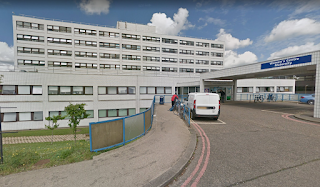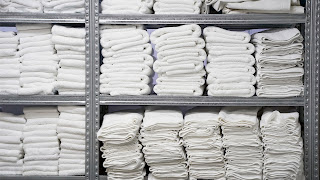As I said in my previous article, see: http://hpanwo-hpwa.blogspot.com/2022/02/lets-just-help-each-other-out.html,
being a Delivery Suite porter is an elite position within the Hospital
Portering Service. It is far more involved and requires more knowledge than any
other portering discipline. I entered DS towards the end of my first year of
hospital portering, as soon as I finished my relief tour. By then I was aged
eighteen and was fully trained up in the basics of portering; and I had gained
some experience. I was also extremely gung-ho, having completely fallen in love
with hospital portering by then. I had done a day in DS already as part of my
orientation, shown around by a genial sixty-year old called Brian. I entered
the department eagerly and was in there for nine years. The first five of those
nine years were wonderful and I loved every moment of it. There were four DS
porters, one per shift, and on each shift there was also a working senior and a
lodge porter. We had great fun, playing games of cricket with rubber balls from
the SSNAP stall and with chair legs as bats on nightshift, meeting up for quiet
cups of tea in one corner or another with the domestics or HCA's and a million
and one other things that made my time on duty a joy. I felt truly at home,
among a loving community. I did as much overtime as I could, for pleasure as
much as for money and used to look forward to going to work. However, that all
changed. As is often the case in the NHS, there was not a single identifiable moment
when it all went wrong. I can't point to the day, the month or even the year
the disease struck. All I remember is, sometime in 1997 or 8, reminiscing about
my early service, noticing how the present was far worse and thinking:
"How on earth did that happen?" However, I could articulate the
malaise. To begin with, the most intense snobbery crept into JRI. I knew that
there had always been social divisions within the hospital. Such things are natural,
inevitable and not necessarily harmful. The doctors were "above" the nurses
who were "above" the porters etc; but there was always mutual
respect. Sure, there were one or two distasteful characters from day one, and
I'll cover them in a separate article; but they were few and far between. For
the most part, the personnel appreciated each other, regardless of their place within
the hierarchy. Everybody understood that we were all part of a team and our
mission was dependent on all of us. Therefore I was horrified one day when I
received the news that the DS porters' lodge was going to be moved. Until then
we had a lovely room with windows overlooking the outpatients garden, but this
was listed to become the office for the Silver Star midwifery officer. We were
going to be moved to an internal chamber close to the DS control desk. I
wouldn't have minded so much, but then I overheard the DS sister say:
"That room is too good for the porters." At the same time I found
that the intake of newly qualified younger midwives was very different to the
older contingent that I had become used to. For the most part, they were cold
and aloof with the porters, only ever speaking to us to criticize. They were
always courteous and reverent to the obstetricians and others above them or
equal to them, but casually disdainful of the porters, HCA's and domestics.
Serving with them also introduced me to a new concept that is all too prevalent
today: wokeism. This was at the same time my own DS colleagues were being far
from supportive, as I explain in the above background article.
I don't want the HPWA blog to be political; this is the
purpose of the other HPANWO pages. However I do consider myself a bit of an
advanced scout in the resistance against the Wokerati, long before they rose to
dominance in society, at least to the level they are today. A team of working
class males mixed into a department of educated middle class women is the perfect
canary in the coalmine. As I said, I had no problem at all with midwives originally.
It is true that midwives are almost exclusively female. I only ever knew two
male midwives in my entire career. So, although I'll be accused of misogyny by some
readers of this article, like I was at the time, it's not true. Until the
mid-90's I only ever met a handful of midwives I didn't like. It used to take
four years to train as a midwife; the first half of those four being a standard
two-year nursing diploma (this was in the days before degree nursing when you
could train up in the NHS with a salary). Then this all changed and a "direct
entry" midwifery course was introduced, meaning somebody could train to be
a midwife off the street in a single three-year programme without any nursing
qualification. It is obvious that at the same time, the healthcare education
system brought in what is nowadays known as "critical race theory". A
trainee midwife would learn more than just her job; she would be indoctrinated
into feminism. At the same time the Trust's obstetric and gynaecology services were
united under one roof in JRI, and therefore it inevitably was renamed "the
Women's Centre". When one of the porters left, he was replaced with a
female porter. This is not unprecedented; about five percent of hospital
porters are women. howevver, when a second porter left and was replaced by a
woman I began to feel suspicious. I made some inquiries and found that the DS
management had contacted Facilities and specifically requested female porters
for Delivery Suite. This is, of course, totally illegal. It breaches the Equal
Opportunities Act of 1988 and the Equality Act of 2010; but, as always when
white straight men are the beneficiaries of that law, it is more difficult to
apply it. The Facilities management cooperated unquestioningly. Never were any
of us consulted about this policy. What's more the other porters outside DS
chimed in to support the move, saying that DS was a "woman's job".
This was not their real motive; what they really wanted was to be removed from
relief training schedule for DS because it is generally a highly unpopular
placement, because of its isolation and difficulty. If I had been in their
position at that time, I wouldn't have blamed them, as I found out later. At
the same time, the hostility against me increased. It must have done for the
other remaining male porter, although he always denied it. I got the distinct
impression that I was being shown the door. This antipathy cut me like a blade.
I had always been a friendly, cooperative and dedicated member of staff, but
many of the new midwives still wanted me gone. It is true that our duties
involve dealing with female patients in very sensitive situations, like setting
up lithotomic poles; and forceps, ventouse and caesarean section births in
theatre; but we did our job professionally and with a lot of kindness, as
healthcare professionals should. I felt uncomfortable with the fact that nobody
ever suggested than a man cannot be an obstetrician; as I said, we even had
male midwives. It was a statement that porters are distinctly sub-professional
and so are bound by different rules. One day, in the spring of 1999, I was
ordered to leave theatre in a totally inappropriate situation. The person who
gave me the order was one of the nastiest direct entry midwives of all and I suspect
she did it deliberately to try and humiliate me. Something inside me snapped
and I refused. She repeated the order and I still refused. There was an angry
silence in the theatre and the procedure continued. I didn't care. At that
moment I didn't care if I got sacked. The following day I was summoned to a
meeting in which I was reprimanded for refusing to leave theatre. They said:
"It doesn't matter what the circumstances are! If you are ordered to leave
theatre, you leave! You can submit a grievance afterwards." I had enough
experience by then to know that "submit a grievance" in the NHS is
the equivalent of "just send me a memo, will you?". Few grievances
have ever been sustained to my knowledge, and most were not even acted upon.
They threatened to suspend me. There was only one thing I could do, the thing I
should have done at least three years earlier; I requested a transfer. I'm
pleased to say the head porter was very sympathetic and helpful. He arranged an
interview for me with the deputy head of general theatres and I was moved over
to JRII onto a rotary shift position within ten days. It felt like being
released from prison. The happiness I had experienced during my halcyon days of
the early '90's returned so suddenly and intensely that I was overwhelmed. I
served in theatres proudly and contentedly right up until the ODO incident of
2005, see: https://hpanwo-hpwa.blogspot.com/2017/07/odo.html
and: http://hpanwo-radio.blogspot.com/2022/02/the-gas-spanner-programme-19.html.
One of the other porters criticized me afterwards, saying that I should have
engaged in all-out lawfare against DS, suing them for sexism. I sometimes think
maybe I should have, and if I had been as tough back then as I was later on, I
would have. The problem is, as I've said before, if you're a white heterosexual
man such actions are an uphill struggle. The union would not have backed me up
and I would have had to arrange a private prosecution. Today there are numerous very well-funded and organized anti-woke campaign groups such as the
Workers of England Union, see: https://www.workersofengland.co.uk, and Solidarity, see: https://solidaritytradeunion.org, but in those days there were hardly any; certainly none who would have been in
a position to help me. My rebellion must have had some effect though because
over the next few years after 1999 some of the replacement DS porters were
male. Nothing was said openly, but it does look like management did abandon
their women-only DS portering policy. My downfall in DS was one of the most
upsetting experiences I had in hospital portering, as well as embarrassing. This
is probably why I've not written about it in detail before until now. It still
feels painful to think about it after nearly thirty years. However, when I look
back on it rationally, I feel no regrets. I realize that it was actually an
essential part of building my character and educating me into the realities of
society. So many people have so many excruciating memories like mine. Whenever
it gets you down, just imagine... what you would be like today if you had never
had that experience?
See here for background: http://hpanwo.blogspot.com/2021/08/political-correctness-portal.html.
See here for background: http://hpanwo.blogspot.com/2021/08/political-correctness-portal.html.


